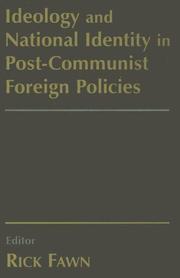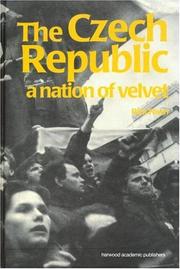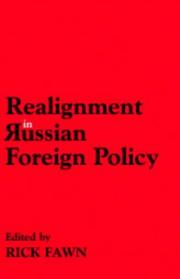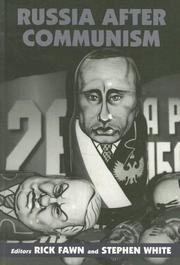| Listing 1 - 10 of 19 | << page >> |
Sort by
|

ISBN: 0714684155 0203487540 9780203487549 0714655171 9780714655178 9780714684154 9786610078233 6610078238 1280078235 9781135757861 9781135757908 9781135757915 Year: 2003 Publisher: London Portland, Or. Frank Cass Publishers
Abstract | Keywords | Export | Availability | Bookmark
 Loading...
Loading...Choose an application
- Reference Manager
- EndNote
- RefWorks (Direct export to RefWorks)
A comparative analysis of the foreign policies of eight post-communist states which considers the extent to which official communist ideology has been replaced by nationalism and establishes how these states express their national identities through foreign policy.
Nationalism --- Nationalisme --- Former Soviet republics --- Ex-URSS --- Foreign relations --- Relations extérieures --- #SBIB:328H27 --- #SBIB:327H14 --- #SBIB:321H81 --- Instellingen en beleid: Midden- en Centraal Europa: algemeen --- Buitenlandse politiek: Oosteuropese landen (behalve GOS) --- Westerse politieke en sociale theorieën vanaf de 19e eeuw : nationalisme, corporatisme, fascisme, nationaal socialisme, rechtsextremisme, populisme --- Nationalism. --- Post-communism. --- Relations extérieures --- Post-communism --- Postcommunism --- Consciousness, National --- Identity, National --- National consciousness --- National identity --- Europe, Eastern --- CIS countries --- Commonwealth of Independent States countries --- Ex-Soviet republics --- Ex-Soviet states --- Former Soviet states --- New Independent States (Former Soviet republics) --- Newly Independent States (Former Soviet republics) --- NIS (Former Soviet republics) --- Foreign relations. --- World politics --- Communism --- International relations --- Patriotism --- Political science --- Autonomy and independence movements --- Internationalism --- Political messianism --- Europe, Eastern -- Foreign relations -- 1989-. --- Former communist countries - Foreign relations. --- Former Soviet republics - Foreign relations. --- Former Soviet republics -- Foreign relations. --- Nationalism - Former communist countries. --- Nationalism - Former Soviet republics. --- Political Theory of the State --- Political Science --- Law, Politics & Government

ISBN: 9058230449 Year: 2000 Publisher: Amsterdam Harwood
Abstract | Keywords | Export | Availability | Bookmark
 Loading...
Loading...Choose an application
- Reference Manager
- EndNote
- RefWorks (Direct export to RefWorks)
Book
ISBN: 9781137305480 Year: 2013
Abstract | Keywords | Export | Availability | Bookmark
 Loading...
Loading...Choose an application
- Reference Manager
- EndNote
- RefWorks (Direct export to RefWorks)
In retrospect, NATO and EU enlargements can be viewed as fairly simple processes; they admitted states that wanted to be accepted and were lavishly rewarded. In contrast, this study explores the harder politics waged by the much larger regional organizations of the Council of Europe and the Organization for Security and Cooperation in Europe (OSCE). These organizations lack material incentives or instruments of coercion, instead having to work on the basis of shared values. They also face a variety of threats from discordant members. In this book, the author uses internal conditionality to explain how these organizations have cleverly and subtly responded to such difficulties. Drawing on interviews in a range of post-communist countries and with practitioners inside and outside the organizations, the diverse case studies in this book examine issues of conflict, democratization, the death penalty, rewarding high office and retaining institutional membership. The author explores how international organizations which lack powers of compulsion can respond to recalcitrant member-states and offers practical lessons for the international promotion of norms.

ISBN: 0714654965 0714683965 9780714683966 9780714654966 Year: 2003 Publisher: London: Cass,
Abstract | Keywords | Export | Availability | Bookmark
 Loading...
Loading...Choose an application
- Reference Manager
- EndNote
- RefWorks (Direct export to RefWorks)
Russia (Federation) --- Foreign relations --- International relations. Foreign policy --- Russia --- #SBIB:328H262 --- #SBIB:327H13 --- Instellingen en beleid: Rusland en het GOS --- Buitenlandse politiek: U.S.S.R. / GOS / Russische Federatie --- -Russia (Federation) --- Russie --- Foreign relations. --- Relations extérieures --- Russia (Federation) - Foreign relations
Book
ISBN: 303026937X 3030269361 Year: 2020 Publisher: Cham : Springer International Publishing : Imprint: Palgrave Macmillan,
Abstract | Keywords | Export | Availability | Bookmark
 Loading...
Loading...Choose an application
- Reference Manager
- EndNote
- RefWorks (Direct export to RefWorks)
The book addresses security threats and challenges to the European Union emanating from its eastern neighbourhood. The volume includes the expertise of policy and scholarly contributors coming from North America, Russia and Central Asia, and from across the EU. Themes and issues include the EU’s capacities and actorness, support from the United States, challenges from Russia, and a range of case studies including Ukraine, other post-Soviet conflicts, the Kurdish question, Central Asia, and terrorism and counter-terrorism. Authors identify current threats and place these challenges into necessary historical context. They offer long-term recommendations for actionable goals to achieve greater stability in this complex and volatile region. This work is explanatory and long-lasting, and will engage readers in the limits and possibilities of the EU in a challenging era and in its most vital and demanding geographic arena.
National security --- European Union. --- Security, International. --- Europe—Politics and government. --- Russia—Politics and government. --- Middle East—Politics and government. --- European Union Politics. --- International Security Studies. --- European Politics. --- Russian and Post-Soviet Politics. --- Middle Eastern Politics. --- Collective security --- International security --- International relations --- Disarmament --- International organization --- Peace --- Europe, Eastern --- European Union countries --- United States --- Foreign economic relations --- Foreign relations

ISBN: 1135287309 1280055626 0203643542 9780203643549 9789058230430 9058230430 9789058230447 9058230449 9786610055623 6610055629 9781135287306 9781135287252 1135287252 9781135287290 1135287295 9058230430 9058230449 9781280055621 9812611401 Year: 2000 Publisher: Amsterdam, the Netherlands Harwood Academic
Abstract | Keywords | Export | Availability | Bookmark
 Loading...
Loading...Choose an application
- Reference Manager
- EndNote
- RefWorks (Direct export to RefWorks)
Czechoslovakia has captured the nation's imagination throughout the twentieth century. The Allied betrayal of the country to Nazi Germany in 1938 was to demonstrate the appalling consequences of naive appeasement of aggression. The wholesale reform of Soviet communism in the Prague Spring of 1968 won western support, and sympathy when it was crushed by Warsaw Pact tanks. The fierce communist regime thereafter was brought down almost magically in 1989. Czechoslovakia added to the international political vocabulary the term, 'Velvet Revolution', and the velvet metaphor has characterised much of...
Czech Republic --- Česká republika --- ČR --- Tschechische Republik --- Česko --- Czechia --- チェコ --- Cheko --- チェコ共和国 --- Cheko Kyōwakoku --- Tschechien --- Tschechenland --- Tschechei --- République tchèque --- República Checa --- Chequia --- Txèquia --- Txeca --- República Txeca --- Češka --- Czech Socialist Republic (Czechoslovakia) --- Czechoslovakia --- History. --- Politics and government

ISBN: 1135758751 1280103884 0203010884 9780203010884 9780714654966 0714654965 9780714683966 0714683965 9781135758707 9781135758745 9781135758752 1135758743 Year: 2003 Publisher: London ; Portland, Or. : Frank Cass,
Abstract | Keywords | Export | Availability | Bookmark
 Loading...
Loading...Choose an application
- Reference Manager
- EndNote
- RefWorks (Direct export to RefWorks)
This collection provides international perspectives on the evolution of Russia's foreign relations and analyses official Russian responses to major regional and international developments, including NATO and EU enlargement and the post-September 11 international ""war on terrorism"".
Russia (Federation) --- Foreign relations. --- Foreign relations
Book
ISBN: 1139087339 0521759889 Year: 2009 Publisher: Cambridge : Cambridge University Press,
Abstract | Keywords | Export | Availability | Bookmark
 Loading...
Loading...Choose an application
- Reference Manager
- EndNote
- RefWorks (Direct export to RefWorks)
Regions are now everywhere across the globe and are increasingly fundamental to the functioning of all aspects of world affairs from trade to conflict management, and can even be said to now constitute world order. But to what extent are their origins, purposes, operating principles and wider consequences the same? An eminent and international collection of scholars examine the central but disputed concept of regions from a range of perspectives and assess leading contemporary examples. Rather than uncritically celebrating regions, the collection also offers some contrarian findings and wider lessons of interest across the study of International Relations and beyond.
Globalization --- Regionalism (International organization) --- International organization. --- Interregionalism. --- Security, International. --- Collective security --- International security --- International relations --- Disarmament --- International organization --- Peace --- Inter-regional relations --- Interregional relations --- Transregional relations --- Transregionalism --- Regionalism --- Federation, International --- Global governance --- Interdependence of nations --- International administration --- International federation --- Organization, International --- World federation --- World government --- World order --- World organization --- Congresses and conventions --- Political science --- International agencies --- International cooperation --- Security, International --- World politics --- Global cities --- Globalisation --- Internationalization --- Anti-globalization movement --- Political aspects. --- Social Sciences --- Political Science
Multi
ISBN: 9783030269371 Year: 2020 Publisher: Cham Springer International Publishing :Imprint: Palgrave Macmillan
Abstract | Keywords | Export | Availability | Bookmark
 Loading...
Loading...Choose an application
- Reference Manager
- EndNote
- RefWorks (Direct export to RefWorks)
The book addresses security threats and challenges to the European Union emanating from its eastern neighbourhood. The volume includes the expertise of policy and scholarly contributors coming from North America, Russia and Central Asia, and from across the EU. Themes and issues include the EU’s capacities and actorness, support from the United States, challenges from Russia, and a range of case studies including Ukraine, other post-Soviet conflicts, the Kurdish question, Central Asia, and terrorism and counter-terrorism. Authors identify current threats and place these challenges into necessary historical context. They offer long-term recommendations for actionable goals to achieve greater stability in this complex and volatile region. This work is explanatory and long-lasting, and will engage readers in the limits and possibilities of the EU in a challenging era and in its most vital and demanding geographic arena. Rick Fawn is Professor of International Relations at the University of St Andrews, UK.
International relations. Foreign policy --- Politics --- Law --- veiligheid (mensen) --- politiek --- Europese instellingen --- Europese politiek --- Middle East --- Russia --- Europe

ISBN: 0714652938 0714682586 Year: 2002 Publisher: London Cass
Abstract | Keywords | Export | Availability | Bookmark
 Loading...
Loading...Choose an application
- Reference Manager
- EndNote
- RefWorks (Direct export to RefWorks)
Russia's transition from communism holds great significance not only for that country but also for the wider world. This collection of essays examines the broad spectrum of Russia's transition since 1991 - considering not only the pattern of events but also what the changes have meant for Russians themselves, and for their future. Particular attention is given to political attitudes and foreign policy, to the changing status of women, to religion and censorship, and to the continuing war in Chechnya.
Politics --- Russian Federation --- Post-communism --- Postcommunisme --- Russia (Federation) --- Russie --- History --- Politics and government --- Social conditions --- Histoire --- Politique et gouvernement --- Conditions sociales --- Russia
| Listing 1 - 10 of 19 | << page >> |
Sort by
|

 Search
Search Feedback
Feedback About UniCat
About UniCat  Help
Help News
News